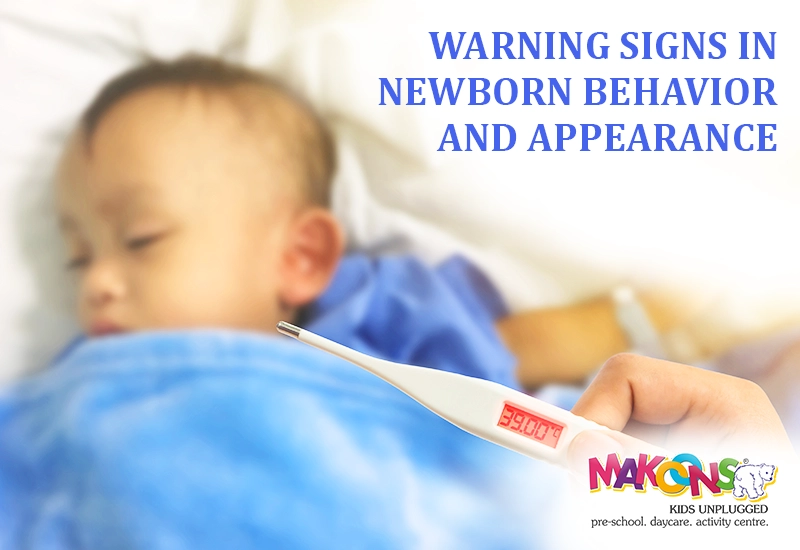Every small sound, movement, or change in your infant can cause you to question if everything is OK. Although most baby behaviours are quite normal, some newborn warning signs require quick medical treatment.
Knowing what is typical and what is not will help you to feel more confident as a parent. This book will enable you to identify significant baby behaviour red flags and know when to be concerned about newborn changes suggesting a problem.
Normal vs. Concerning Newborn Behavior
Many of the seemingly unusual activities that new babies engage in are quite common. They have abnormal respiratory patterns, weep without a clear reason, sleep a lot, and create hilarious expressions. Some actions and appearances, meanwhile, are indicators of possible problems.
Early recognition of odd neonatal behaviour can significantly improve the health of your baby. Trust your intuition; always best to see your paediatrician if something seems off.
Critical Warning Signs That Need Immediate Medical Care
Breathing Problems
Breathing problems are among the most severe symptoms of infant sickness. Call 911 immediately if your infant:
- Pauses breathing for more than ten seconds.
- Breathes far faster—more than sixty breaths every minute.
- Makes grunting sounds with each breath
- Has blue lips, tongue, or face
- Sucks in their chest or ribs when breathing
- Flaring their nostrils while breathing
Normal newborn breathing can be irregular, but severe changes need immediate attention.
Feeding Concerns
Feeding problems are important newborn warning signs to watch for:
- Refuses to eat for more than 8 hours
- Vomits up everything they eat
- Shows no interest in feeding
- Cannot latch or suck properly
- Becomes very sleepy during all feedings
- Loses more than 10% of birth weight
Newborns need to eat regularly to grow and stay healthy.Any significant dietary modification should be brought up with your doctor.
Temperature Changes
Both fever and low body temperature are serious baby behavior red flags:
- Fever more than 100.4°F (38°C)
- lower temperature of the body than 97°F (36.1°C)
- Feeling very hot or very cold to the touch
- Shivering or excessive sweating
Never ignore temperature changes in newborns, as their immune systems are still developing.
Physical Appearance Warning Signs
Skin Color Changes
A lot about your baby’s health can be inferred from their skin tone.Watch for these signs of newborn illness:
- Blue color around lips, tongue, or face
- Yellow color that gets worse or spreads (jaundice)
- Very pale or gray skin
- A purple or red rash that doesn’t fade when pressed
- Mottled or blotchy skin that doesn’t improve
Some skin color changes are normal, but dramatic or worsening changes need medical attention.
Eye and Face Issues
Unusual newborn behaviour related to eyes and face includes:
- Eyes that don’t move together or seem crossed all the time
- White spots or cloudiness in the pupils
- Excessive tearing or discharge
- Swelling around the eyes or face
- Not opening eyes at all after the first few days
While some eye coordination issues are normal in newborns, persistent problems should be checked.
Head and Neck Concerns
Important newborn warning signs involving the head:
- Soft spot (fontanelle) that bulges when the baby is calm
- Soft spot that sinks in deeply
- A head that tilts to one side all the time
- Cannot lift head at all during tummy time after 2 weeks
- Unusual head shape that seems to be getting worse
Behavioral Red Flags to Monitor
Crying Patterns
While all babies cry, certain crying patterns are baby behavior red flags:
- High-pitched, shrill crying that sounds different
- Crying for more than 3 hours straight without stopping
- Weak crying or no crying at all
- Crying that gets worse instead of better over time
- Cannot be comforted no matter what you try
Understanding your baby’s normal crying patterns helps you notice when to worry about newborn changes.
Sleep and Activity Levels
Unusual newborn behaviour in sleep patterns includes:
- Sleeping more than 18-20 hours per day
- Cannot be woken up for feedings
- Never seems alert or awake
- Extremely fussy and cannot settle
- Sudden changes in sleep patterns
Movement and Muscle Tone
Watch for these signs of newborn illness in movement:
- The very floppy or limp body
- Extremely stiff or rigid muscles
- Jerky, uncontrolled movements
- Not moving arms or legs normally
- Trembling or shaking that doesn’t stop
Digestive System Warning Signs
Bowel Movement Changes
Normal newborn bowel movements vary, but these are concerning newborn warning signs:
- No bowel movement in first 48 hours
- Hard, pellet-like stools
- White or clay-colored stools
- Black stools after the first few days
- Blood in stool
- Severe constipation or diarrhea
Vomiting vs. Spitting Up
Most babies spit up, but forceful vomiting is different:
- Projectile vomiting that shoots across the room
- Vomiting bile (green or yellow)
- Vomiting blood
- Vomiting everything for several feedings in a row
When to Trust Your Instincts
You know your infant most as a parent. These baby behaviour red flags should always cause you to call your doctor:
- Something just does not feel right.
- Your child seems rather different from normal.
- Changes cause you concern or anxiety.
- Many little worries compound to cause more anxiety.
Never hesitate to call your paediatrician. They would much prefer you call with questions than miss something crucial.
Building Confidence as a New Parent
Developing the ability to spot atypical newborn conduct takes time. Keep a basic notebook noting sleep habits, eating times, and any worries. This provides your doctor with valuable information and aids in your noticing of changes.
Recall that most infant issues prove to be normal deviations. Knowing these symptoms of infant disease, however, provides you piece of mind and helps you guard the health of your child.
Also Read – Newborn Sleep Safety: What Parents Need to Know?
Conclusion
Every new parent has to learn when to worry about newborn behaviour and looks. Although every small change can cause anxiety, recognising these crucial newborn warning signals can help you make wise decisions on the care of your infant.
Trust your parental instincts; keep educated about typical newborn growth; never hesitate to call your healthcare practitioner if something seems unusual. Always worth a phone call to the doctor are the health and safety of your child.
Remember—you are learning just as much as your child is developing. Over time and experience, you will get more sure in identifying what is typical for your child and when to worry about newborn developments that really call for attention.


